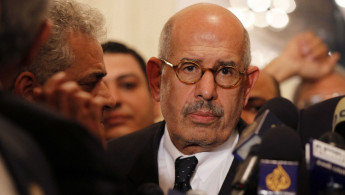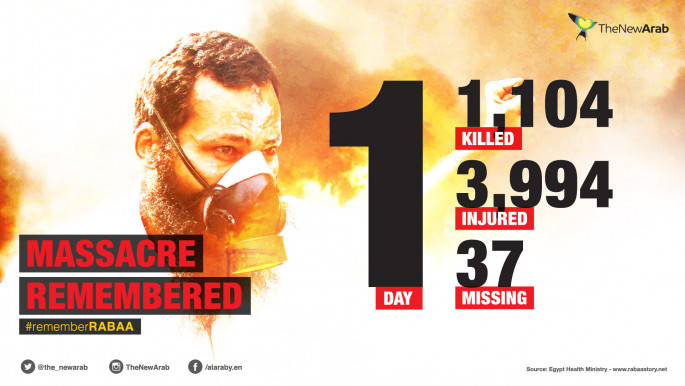ElBaradei: 'Government threatened to destroy me over Rabaa opposition'
Egypt's exiled former vice-president has revealed that government agents threatened to "destroy him" due to his opposition to using violence to disperse anti-coup protesters in 2013.
Mohamed ElBaradei, a leading Egyptian opposition figure, disclosed details of a government-backed campaign of intimidation against him in the days preceding the suppression of two large sit-ins in Cairo's Rabaa and al-Nahda squares.
On 14 August 2013, the Egyptian military and police killed an estimated 1,000 peaceful protesters demonstrating against the military takeover of the country.
The large protests of mostly Muslim Brotherhood supporters followed a coup against Egypt's first democratically-elected President Mohamed Morsi a month earlier.
ElBaradei, who was vice-president at the time, stepped down the same day as the Rabaa massacre in protest at the violent suppression of the demonstrations.
"On August 6 2013, a well-known writer in the state-owned al-Akhbar newspaper wrote a long op-ed in which he said I was 'a dangerous man for the people and the state' - the same evening several guests on prime time political talk shows launched 'scathing attacks' against me," ElBaradei wrote on Facebook.
He added that on the following day "organs of the state" contacted him to say this was just a "warning" and that they would "destroy him" if he kept on working towards a peaceful dispersal of the sit-ins at Rabaa square.
"At that moment I sadly realised that there was no space for me in that climate to take part in public work and that I alone would not have been able to swim against the tide. Therefore, a better alternative for me was to remove myself from a scene, which went against my opinions, convictions and conscience," ElBaradei added.
The Facebook post is the latest in a series of social media posts, in which the 73-year-old who has been living in exile since his resignation, has broken three years of silence on the events surrounding the 2013 military coup against Morsi.
Human Rights Watch [HRW] has said the raids on the Rabaa and al-Nahda Squares were "one of the largest killings of demonstrators in a single day in recent history" and likely amounted to crimes against humanity.
In August, on the third anniversary of the massacre, the human rights group urged Egyptian authorities to compensate the families of the victims.
"Egypt's parliament should pass a transitional justice law establishing a new, impartial investigation into the mass killings of protesters in 2013 that will lead to accountability and fair compensation for victims' families," the rights watchdog said.






 Follow the Middle East's top stories in English at The New Arab on Google News
Follow the Middle East's top stories in English at The New Arab on Google News


